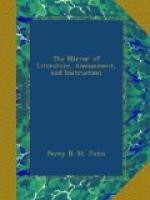* * * * *
THE ANECDOTE GALLERY.
* * * * *
DOCTOR PARR.
Concluded from page 334.
Parr was evidently fond of living in troubled waters; accordingly, on his removal to Colchester, he got into a quarrel with the trustees of the school on the subject of a lease. He printed a pamphlet about it, which he never published; restrained perhaps by the remarks of Sir W. Jones, who constantly noted the pages submitted to him, with “too violent,” “too strong;” and probably thought the whole affair a battle of kites and crows, which Parr had swelled into importance; or, it might be, he suppressed it, influenced by the prospect of succeeding to Norwich school, for which he was now a candidate, and by the shrewd observation of Dr. Foster, “that Norwich might be touched by a fellow feeling for Colchester; and the crape-makers of the one place sympathize with the bag-makers of the other.” If the latter consideration weighed with him, it was the first and last time that any such consideration did, Parr being apparently of the opinion of John Wesley, that there could be no fitter subject for a Christian man’s prayers, than that he might be delivered from what the world calls “prudence.” However it happened, the pamphlet was withheld, and Parr was elected to the school at Norwich.
At Norwich, Parr ventured on his first publications, and obtained his first preferment. The publications consisted of a sermon on “The Truth of Christianity,” “A Discourse on Education,” and “A Discourse on the Late Fast;” the last of which opens with a mistake singular in Parr, who confounds the sedition of Judas Gaulonitis, mentioned in Josephus, (Antiq. xviii. 1. 1.) with that under Pilate, mentioned in St. Luke, (xiii. 1, 2, 3.); whereas the former probably preceded the latter by twenty years, or nearly. The preferment which he gained was the living of Asterby, presented to him by Lady Jane Trafford, the mother of one of his pupils; which, in 1783, he exchanged for the perpetual curacy of Hatton, in Warwickshire, the same lady being still his patron neither was of much value. Lord Dartmouth, whose sons had also been under his care, endeavoured to procure something for him from Lord Thurlow, but the chancellor is reported to have said “No,” with an oath. The great and good Bishop Lowth, however, at the request of the same nobleman, gave him a prebend in St. Paul’s, which, though a trifle at the time, eventually became, on the expiration of leases, a source of affluence to Parr in his old age. How far he was from such a condition at this period of his life, is seen by the following incident given by Mr. Field. The doctor was one day in this gentleman’s library, when his eye was caught by the title of “Stephens’ Greek Thesaurus.” Suddenly turning about and striking vehemently the arm of Mr. Field, whom he addressed in a manner very usual with him; he said, “Ah! my friend, my friend, may you never be forced, as I was at Norwich, to sell that work, to me so precious, from absolute and urgent necessity.”




